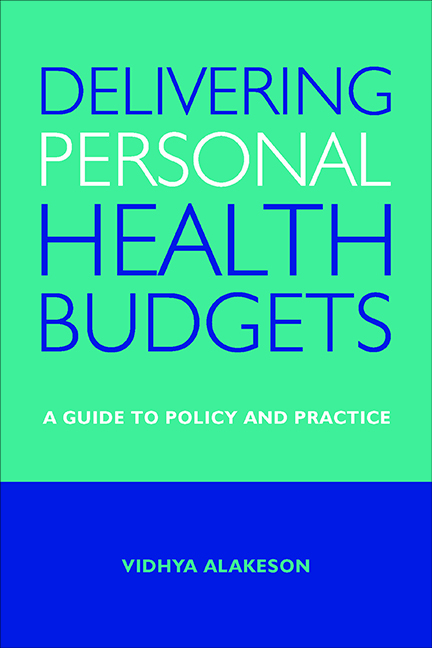Book contents
- Frontmatter
- Contents
- List of tables and figures
- Acknowledgements
- Prologue: Stephen’s story
- Introduction
- Section 1 Introducing personal health budgets
- Section 2 Implementing personal health budgets
- Section 3 Personal health budgets and organisational change in the NHS
- Conclusion
- Epilogue: Jonathan’s story
- References
- Index
twelve - Growing the market: bringing new providers into the NHS
Published online by Cambridge University Press: 03 February 2022
- Frontmatter
- Contents
- List of tables and figures
- Acknowledgements
- Prologue: Stephen’s story
- Introduction
- Section 1 Introducing personal health budgets
- Section 2 Implementing personal health budgets
- Section 3 Personal health budgets and organisational change in the NHS
- Conclusion
- Epilogue: Jonathan’s story
- References
- Index
Summary
PHBs necessitate a more diverse marketplace with a greater variety of providers to be able to cater effectively to the individual needs of budget holders. Experience from social care highlights the risk of offering personal budgets without focusing on market development. In some parts of the country, budget holders who had previously attended day programmes found themselves with few alternative ways of using their money once the day programme had closed. They had the resources to purchase alternatives, but the market had not responded to offer other choices (Needham, 2012). The US state of Michigan had a similar experience when it introduced a self-directed care programme for adults with mental health problems. Without first developing a workforce of certified peer specialists who could offer alternative services to individuals, there was little on offer for budget holders outside of the community mental health centres they were trying to leave.
As the national evaluation shows, PHB holders secured a different mix of services from that purchased by commissioners for the control group. For example, they purchased significantly more wellbeing services and used less hospital care. This meant that they relied on a different range of providers from traditional NHS commissioning. Based on the spending patterns of PHB holders in the pilot programme, the evaluation team estimates that around 12 per cent of the average value of a PHB in the pilot programme went to providers outside the NHS. On the basis of this estimate, the team recommends that ‘policy makers should anticipate that the use of personal health budgets is likely to result in a higher level of expenditure going to “non-conventional” providers (for example, a greater use of non-NHS providers)’ (Forder et al, 2012, pp 168-70). With significant amounts of money in search of new providers, it is vital that the market is adequately developed to respond (Glasby, 2012).
Through its Any Qualified Provider initiative, the government is seeking to introduce a greater diversity of private, independent and voluntary sector providers into community and mental health services so that individuals can receive care in ways that better suit their preferences. Any Qualified Provider is supported by the extension of PbR into mental health and community services, as discussed in Section 2.
- Type
- Chapter
- Information
- Delivering Personal Health BudgetsA Guide to Policy and Practice, pp. 135 - 142Publisher: Bristol University PressPrint publication year: 2014



